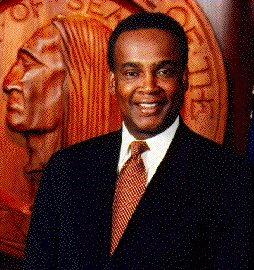

A 1964 Gallup Poll found that 75 percent of Americans trusted the federal government. Thirty years--after Vietnam, Watergate, Iran-Contra, the House banking scandal--the poll found only 25 percent gave their federal leaders the stamp of approval.
Closer to home, increasing numbers of students at the UW Graduate School of Public Affairs say they prefer careers in non-profit agencies rather than in government. The seething frustration with government leaders is one reason.

The reasons for this are global and multifaceted, says Rice. He points to the fundamental change in America's workplace. With employers downsizing, people have to fend for themselves more--and don't like it. In addition to feeling that government should somehow prevent this from happening, people also feel the government should do more to help them, Rice believes.
"People don't like knowing their lives aren't as secure as their parents' lives," he says. "We are wrestling with a complex change and people feel government isn't adapting to the change. So there is anger. People want to see government making the same adjustments they have to make."
![]()
"That took its toll with the public," says McDonald. "People know Social Security won't work forever; the deficit is a scheme that can't continue, and people are tired of it. They don't believe government as an institution."
John Carlson, '81, a host on conservative Seattle talk radio station KVI, often hears about mistrust from his listeners. "I think people trust the government to do what government ought to do. For instance, when we send our troops to win a war against Saddam Hussein, most people have complete confidence in our government. But when we are doing something like nation-building in Somalia, or the way welfare has gotten out of hand, or exploding deficits and debt, that breeds mistrust. The government has strayed from what it is supposed to do.
"We Americans will figure out that the less you have government involved in things like the anti-poverty business, the better it will be. The government doesn't solve the problem, it makes it worse. Americans have sensed the limits of government to solve the problems and are trying to deal with them on their own. Welfare reform at the state level is one example."
And there are other factors, say UW experts, that make people contemptuous of elected leaders: legislative gridlock, negative political campaigning, scandals and the media.
Mistrust--A Historical Tradition?
How the Information Revolution Feeds Mistrust
Getting Americans to Believe in Their Government
Again
Trust
in Government Project Website